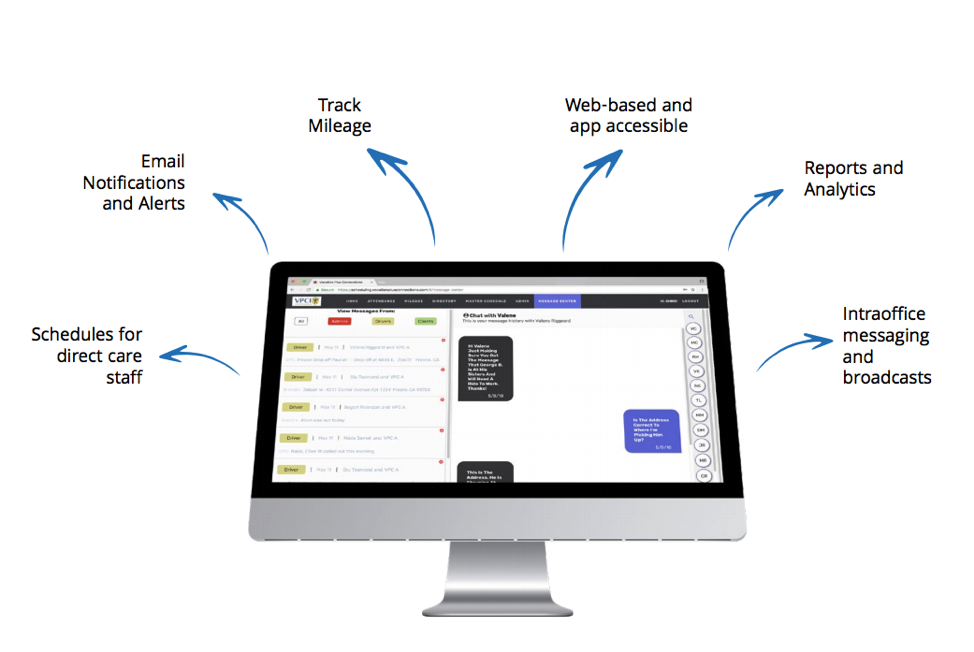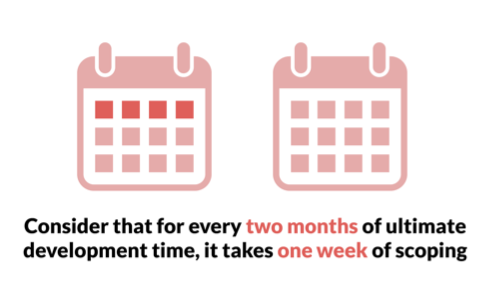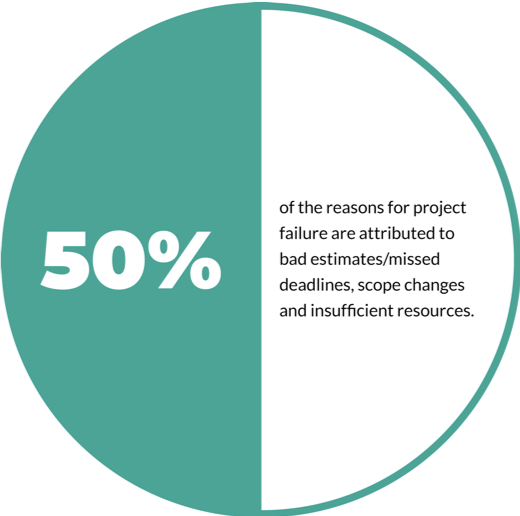Critical Questions to Ask Before Meeting With a Custom Software Firm

Critical Questions to Ask Before Meeting With a Custom Software Firm
Contributed ContentResearch shows that poorly executed IT projects can threaten a company’s overall stability. Will your next project avoid becoming part of this statistic?
According to McKinsey, 17% of IT projects can go so poorly that they can threaten the very existence of the company. If you’re planning on consulting a custom software company about your next big project, there are a series of questions you should be asking yourself to prepare.
From basic questions about your project to details about the timeline, scope and desired outcome - you should be going into your meeting armed with answers that will help the custom software firm understand your project better and help you leave with a thorough consultation that gets you closer to both your project’s completion and finding the right software partner.
Any custom developer can deliver an MVP in truncated timelines, but custom software firms offer team flexibility, relevant tracking and development tools, agile workflows, and the exquisite talent of speaking to your unique business needs and applying integrated dev solutions to fit those needs.
Businesses should first think of questions that will be asked about their project and then think of questions to ask the software development company.
9 Questions to Ask Before Hiring a Software Development Company
1. What is your elevator pitch?
2. What type of deliverable do you want?
3. How involved will you be in the development process?
4. What is your timeline?
5. Does the company have the technical experience to complete my project?
6. Can they provide solid references from happy clients?
7. Am I prioritizing budget at the expense of quality?
8. Are they able to speak “business” AND “tech”?
9. Is there a risk that I will pay for the A team but get the B team?
4 Questions to Ask Yourself About Your Project
Before you think about the development process, first think about the project itself and what impact you want it to have on your business.
1. What Is Your Elevator Pitch?
Without an elevator pitch, your project has no scope or goal.
You should be able to explain what your application can do in 30 seconds.
What is the goal of your project (more website traffic, more members, more visibility, revenue, etc.)?
You should know:
- What you want your application to do
- Who your target audience is
- What your big-picture goals are
If you go into a custom software shop without an elevator pitch, you run the risk of going into a development project blind, which could cost more money in the long run.
2. What Type of Deliverable Do You Want?
Consider the type of application you need whether a website, mobile, or customized software solution.
Each of these applications can help your business achieve different goals and require answering different questions.
For example, if you’re thinking of optimizing your business with a new website, what do you want your site to accomplish? Consider these questions:
- Will your website need to be easily editable for content updates?
- Will your website be taking payments for merchandise or a service?
- Will your website need to integrate with a database or other system?
- Will visitors require special admin access to access the site?
E-commerce businesses may want to create or update their website to increase conversions or make a better user experience.
Mobile apps can help businesses reach a different audience. According to Statista, worldwide mobile payment revenue is expected to surpass 1 trillion U.S. dollars in 2019. Don’t let that opportunity pass you by. Consider:
- Which smartphone platform will you be using for your app?
- Will your app be taking payments for merchandise or a service?
- Will your app need an integration to Bluetooth or GPS?
- Which platform is best for the app you want to build: native, hybrid or web-based?
By considering the features you’ll want your mobile app to have, you’ll be better positioned to articulate your vision to the app development company.
Businesses that want a large-scale change effort to capture the benefits of a full, digital transformation might opt for a custom software solution also called a line-of-business application.
In a new McKinsey survey regarding digital transformations, more than 80% of companies say their organizations have undertaken such efforts in the past 5 years.
Whether it’s automating paper workflows or optimizing existing digital tools, a line-of-business application is a tailor-made software solution to your unique challenges.
For example, Vocation Plus Connections, a social services and rehabilitation center, faced challenges in keeping their scheduling system updated in real time.
They hired us (Shift3) to create a custom software solution that allowed staff members to updatetech.com the scheduling system through an interactive dashboard. Through this dashboard, staff members can:
- Track mileage of transportation vehicles
- Schedule appointments
- Get email notifications and alerts
- Enjoy both web-page and app accessibility
- See reports and analytics
- Exchange in-app messages with other employees

As a result, VPS employees spend less time managing schedules and more time working to improve the quality of service to their clients and ramp up their marketing efforts.
If your business needs a custom solution like this, here are some elements to consider:
- Will your custom application need to integrate with other existing systems?
- How many people will be using this application?
- Will security be paramount for your custom business application?
- Will your custom application require HIPAA compliance?
Knowing the answers to these questions beforehand will help you communicate your software needs more clearly to the custom software company you hire.
3. How Involved Will You Be in the Development Process?
Shift3 operates with an agile process for software development. This means that we develop in sprints or phases, where our focus is typically on one piece of the project.
We develop first, then have our clients come back in to see what we’ve done and evaluate if it’s on the right track.
Having our clients involved in this process does two things:
- It allows our clients to see progress being made in real time.
- It allows us to course-correct sooner if something isn’t the way our client envisioned.
We would rather catch issues in the beginning phases rather than wait.
4. What Is Your Timeline?
Timelines are often the one surprising factor when we are accurately pricing and scoping a project. Large projects can range anywhere from six months to a year depending on the size and complexity, while some small websites can be done in a week or two.
Make sure that you’re planning well in advance of when you need the software to be up and running, so your dev firm has the requisite amount of time to build it correctly and with all your overarching goals in mind.
Also, remember to consider your budget when thinking about the timeline:
- Do you have funding to begin a prototype?
- If you don’t have funding, how much time will it take you to secure it?
- Once you have funding, do you have a strategy in place to loop your investors into the planning and dev process?
Also, keep in mind that for every two months of ultimate development time, it takes one week of scoping. For example, scoping can take up to three weeks for a six-month dev project.

Ultimately, a quick scope of work is an uninformed scope of work.
When we scope out a project, we take the extra time to get the inputs and outputs. The scope becomes more about the business outcome a client is trying to achieve and less about the actual MVP.
Questions to Ask the Custom Software Company
After you consider our project, then it’s time to ask potential partners critical questions.
1. Does the Company Have the Technical Experience to Complete My Project?
When choosing a custom software shop, you want to demand experience. Find a company that has a real track record.
They need to have experience in more than just writing code: Your ideal dev shop should have experience leading projects from concept and implementation to support.
Keep these thoughts in the front of your mind:
- How much experience do they have in my vertical/market?
- How many years have they been up and running?
- How many devs do they have experienced in the platform I need for my project?
- Are they willing to share with you the resumes of the people actually doing the work on your project?
- Will they allow me to screen those devs in a short phone call prior to contract signature?
It’s important that the custom software developer you hire will act as a partner in the project, clearly communicating with you and listening to your expectations.
According to PWC, 50% of the reasons for project failure are attributed to:
- Bad estimates/missed deadlines
- Scope changes
- Insufficient resources

Remember to keep these potential challenges in mind when considering companies and weed out the companies that won’t be able to meet your needs and expectations.
2. Can They Provide Solid References From Happy Clients?
References are paramount. When considering a custom software shop, plan to request a few client references to contact.
You definitely want to vet your dev shop with more than just a few Google reviews.
Make sure they can point to a client that can say, “They were professional and the quality of their work was spectacular.”
When you ask for references (and you should always ask), consider this line of thinking:
- Can you give me three clients who can speak well to your track record?
- Do you have a Clutch profile with more than 3 reviews? (e.g., see our profile here)
- What is your Clutch rating?
- Do you have clients who are now advocates for your work?
It’s important to do thorough research to vet which companies would be a good fit for your business and have experience working on similar projects.
3. Am I Prioritizing Cost Over Quality?
In an attempt to reduce costs, companies explore the concept of outsourcing their development projects to international suppliers and developers overseas. Companies in China or India tout a nearly 80% cheaper rate per hour, which is appealing to a startup trying to cut costs.
Though it may seem more cost-effective to go offshore, be aware that total expenditures could end up more than 65% higher than estimated due to several factors and unknown risks.
One of the most painful pitfalls experienced is expecting to receive the same high-level DaaS performance as an onshore dev shop. Equating the two is a mistake.
There are many hidden costs associated with working with an offshore dev firm; those costs don’t always present themselves outright but exist through drastically extended timelines/missed deadlines, communications snafus created by time zone differences, and potentially full-on scoping misses.
If you’re considering offshoring outsourcing, think about these potential risks:
- What are the local laws for protecting your intellectual property?
- Are the costs and timeframes being promised accurate and realistic?
- Is there a full understanding of time frames across time zones?
- How will the product handover work - and ongoing maintainability?
- Are all legal agreements in place across all international parameters?
Overall, there are many risks to consider with offshore outsourcing. However, if you’re diligent, you can mitigate these risks and successfully complete your project.
With onshoring, it’s much more of a comfort to know that if the project goes awry, you’re at least within the same legal system and time zone to litigate or resolve.
4. Are They Able to Speak “Business” and “Tech”?
Thorough communication is the superpower of any credible vendor.
If a dev firm can’t communicate or explain clearly in business nomenclature – not solely “tech” speak – they won’t be able to execute what they’re offering and the client won’t benefit from partnering with them.
Oftentimes, working with devs who don’t share your primary language can often create a disconnect in communication and conceptual understanding.
More thoughts to consider:
- Can they tell me about my industry and the digital tools my business needs to succeed in my industry?
- Can they speak development in layman’s terms for our internal team who might not be familiar with the development process?
- Will their project managers AND their developers help direct the development process (meaning, will the developers simply code according to spec, or will they bring insights and perspective as the progress progresses)?
- Do they speak business and strategy, as well as tech?
Communication is key to any development project so it’s important the company you hire can translate how the tech they offer will benefit your business.
5. Is There a Risk That I Will Pay for the A Team but Get the B Team?
A lot of custom dev shops sell clients the A Team – the team with the most experience and best portfolio - but when the project is acquired, clients get assigned the B team – the team with less experience and not as polished portfolio.
Consider:
- Will they ensure I get the A Team - dev and business - on this project?
- If I get the B Team, can they promise they’ll perform like an A Team?
It’s important you communicate clearly with the company on expectations of quality of work.
Ask Yourself and the Company You Want to Hire the Right Questions
Planning your next custom software project with a development firm is an investment you want to scrutinize from every possible angle.
From early concept ideation processes and business goals to timeline, scope and final minimum viable product, every step of this process is an investment in time and capital.
By preparing yourself with these questions, you’ll be able to make an educated decision for your business (and your stakeholders) and ensure that the development company you’re engaging is:
- Credibly qualified
- Bilingual in business and technology
- Equipped to expertly manage the project’s scope
- Committed to the overall development and success of your project.
We hope these discussion points will lead you closer and inevitably directly to your ideal technology partner.
About Shift3 Technologies
Shift3 Technologies (Shift3) is a full-stack, Development-as-a-Service firm that expertly builds custom enterprise software, apps and websites. The perfect domestic blend of talent and cost, Shift3 provides inspiring custom software development service to the most challenging projects. Focusing on enterprise systems, Shift3’s specialization includes automation, expansion, integration, modernization and installation.
For information on custom software solutions, visit https://shift3tech.com/ or email [email protected] today.
